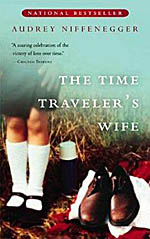
![]() verkisto
verkisto
7/26/2016
![]()
This is not the sort of book I would normally choose to read. It was a Today show book club selection, and almost any time a book is selected by a morning talk-show for "discussion," warning alarms go off in my head. It will probably be too artsy-fartsy or fancy-schmancy for me. But my wife read the book, and really enjoyed it, and she asked me to read it. The premise sounded interesting enough, so I figured what the heck.
I wound up liking this book far more than I expected. This story is about a relationship, and all its ups and downs, relating to the main character's inability to control his leaps through time, along with all the other usual relationship stuff folks encounter. The author manages to capture the two characters and their relationship effectively, so it's hard not to care for them, and care what happens to them. It's also hard not to keep reading, since she starts the novel off with Henry, in his mid-thirties, popping naked into a field and introducing himself to his wife, who is only six years old (oddly, there's nothing perverted about the scene).
Structurally, this book is pretty amazing. She manages to create a relationship where Henry, who has been in an adult relationship with Clare for about six years, pops back into Clare's history and makes himself an integral part of her life for the next sixteen years. Then, when she's about twenty-two, she meets Henry, who has never seen her before in his own life. And despite knowing that if she knows him, then they're meant to be together, Henry has to take time to get to know her at all.
The novel is told in order through Clare's life, but backwards through Henry's. When they catch up, things are told more or less in order, with a few jumps here and there, and that the author managed to map out this huge diorama of a disjointed life is pretty impressive. There was only one logical inconsistency that I noticed in the story, when Henry taught his younger self how to do something important. It was a closed loop, but it may have been intentional. Everything else made sense, unless I missed something that was a little more subtle.
I was also put off a bit in the way that the author chose to narrate the book. The story is told in first person, but from both Henry and Clare. She jumps back and forth between them, and to clarify who's speaking, she states at the beginning of the section who it is. So, when Clare is speaking, the narrative starts "Clare:", and for Henry, it begins "Henry:". It's a bit jarring, and at first it's also a bit confusing, since both characters seem to have identical voices. After a while, though, the transition becomes more natural, and you'll become accustomed to the convention.
Other than those minor issues, this is a great book. It has some appeal to sci-fi readers, will interest folks interested in light fantasy or magic realism, and will also hold well with people who want to read something romantic. It's a hefty book (it has to cover two whole lives, after all), but it's well worth the time to read it.